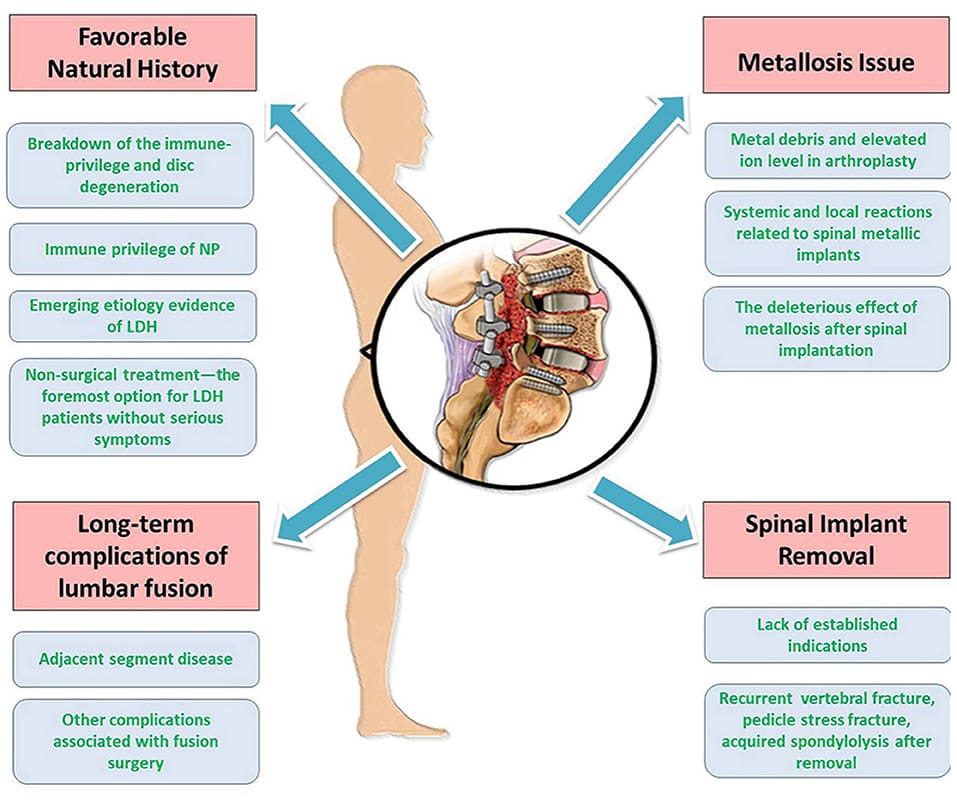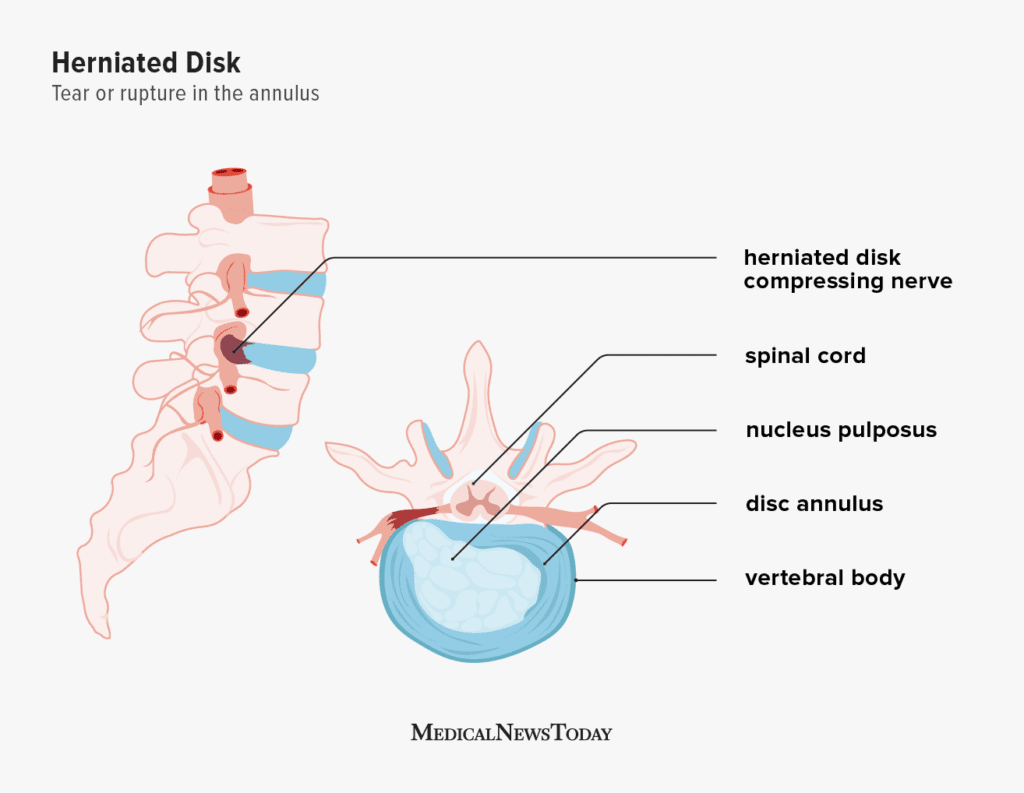In this article, you will discover the potential complications associated with disc protrusion. Disc protrusion occurs when a disc in your spine bulges or extends beyond its normal position, often causing pain and discomfort. Understanding these complications is crucial for effectively managing and treating this condition, ensuring a better quality of life for those affected. So, let’s explore the various complications that can arise from disc protrusion and gain insight into the necessary steps to alleviate them.
Nerve Compression
Loss of sensation
When a disc protrusion occurs, it can put pressure on the nerves in the spine, leading to a loss of sensation. You may experience a decreased ability to feel certain sensations in areas innervated by the affected nerves. This can range from mild numbness to complete loss of feeling in specific areas of your body.
Muscle weakness
Nerve compression caused by a disc protrusion can also lead to muscle weakness. The affected nerves are responsible for transmitting signals to the muscles, allowing them to contract and move. When these nerves are compressed, their ability to transmit signals is compromised, resulting in muscle weakness. This can make simple tasks such as lifting objects or walking more difficult.
Numbness or tingling
Another common symptom of nerve compression is numbness or tingling sensation in the affected area. This occurs when the nerves are unable to transmit signals properly due to compression. You may experience a sensation of pins and needles, or a feeling of numbness in specific regions of your body. This can be both uncomfortable and concerning, as it can interfere with your daily activities.
Reduced Mobility

Limited range of motion
Disc protrusion can limit your range of motion, making it difficult to move certain parts of your body. This can result in stiffness and a decreased ability to perform activities that require flexibility, such as bending or twisting. Reduced mobility can have a significant impact on your overall quality of life and make even simple tasks more challenging.
Difficulty walking or standing
As a result of nerve compression, you may experience difficulty walking or standing. The nerves responsible for innervating the muscles involved in these activities may be affected, leading to weakness and instability. This can result in a cautious gait, unsteady balance, and even pain while bearing weight on your legs.
Trouble with fine motor skills
Fine motor skills involve the coordinated movements of smaller muscles, such as those in your fingers and hands. When nerves are compressed, it can impair your ability to perform precise movements, such as writing, typing, or buttoning a shirt. This can be frustrating and impact your daily activities that require dexterity and precision.
Chronic Pain

Persistent back pain
One of the most common complications of disc protrusion is persistent back pain. The protruding disc can irritate the surrounding structures, including the nerves, ligaments, and muscles in the back. This irritation can cause ongoing pain that may become chronic if left untreated. The pain can vary in intensity and may worsen with certain movements or activities.
Radiating pain down the legs or arms
In addition to back pain, disc protrusion can cause radiating pain down the legs or arms. This is known as radicular pain and occurs when the compressed nerves in the spine send pain signals to other parts of the body. The pain may travel along the path of the affected nerve, leading to discomfort and limited mobility in the affected limb.
Pain while sitting or standing for long periods
Individuals with disc protrusion may experience increased pain when sitting or standing for extended periods. The pressure exerted on the affected disc and nerves can worsen in these positions, leading to heightened discomfort. Prolonged sitting or standing may become a challenge, impacting your ability to work, socialize, or engage in leisure activities.
Bladder or Bowel Dysfunction

Difficulty controlling urination or bowel movements
In some cases, disc protrusion can impact the nerves responsible for controlling urination and bowel movements. This can lead to difficulty in controlling or initiating these actions, resulting in urinary or fecal incontinence. This loss of control can be distressing and have a significant impact on your daily life.
Urinary or fecal incontinence
When the nerves controlling bladder or bowel function are compressed, it can result in urinary or fecal incontinence. This means that you may experience involuntary leakage of urine or stool, which can be embarrassing and inconvenient. It is important to seek medical attention if you notice any changes in your ability to control these bodily functions.
Increased frequency or urgency to urinate
Another bladder dysfunction that can occur as a result of disc protrusion is an increased frequency or urgency to urinate. The compressed nerves can interfere with the normal signals sent from your bladder to your brain, causing a heightened sense of urgency or an increased need to urinate more frequently. This can disrupt your daily routine and impact your quality of life.
Sexual Dysfunction

Erectile dysfunction in men
For men, disc protrusion can contribute to erectile dysfunction. The compression of nerves in the lower back can interfere with the signals required for achieving and maintaining an erection. This can be distressing and impact both physical and emotional well-being.
Decreased libido or sexual pleasure
Both men and women may experience a decrease in libido or sexual pleasure as a result of disc protrusion. The pain, discomfort, and physical limitations associated with this condition can impact one’s desire for sexual activity. Additionally, the compression of nerves may affect the sensory feedback necessary for experiencing pleasure during sexual intercourse.
Difficulty achieving orgasm
Women with disc protrusion may also experience difficulty achieving orgasm. Nerve compression can interfere with the normal signaling pathways involved in sexual response, making it challenging to reach climax. This can be frustrating and impact intimacy and sexual satisfaction.
Muscle Atrophy

Loss of muscle mass
When nerves are compressed, the corresponding muscles may not receive the necessary signals to function optimally. This can result in muscle atrophy, a condition characterized by the loss of muscle mass. As the muscles become weaker due to lack of use, they may gradually diminish in size, leading to a visible decrease in muscle bulk.
Weakness and decreased muscle strength
Muscle weakness is a common consequence of disc protrusion, as nerves are unable to effectively transmit signals to the muscles. This can lead to decreased muscle strength, making routine activities, such as lifting objects or climbing stairs, more challenging. Strengthening exercises and physical therapy may be recommended to help improve muscle strength and prevent further deterioration.
Visible muscle wasting
In addition to weakness and decreased muscle strength, disc protrusion can result in visible muscle wasting. As the muscles lose mass and become weaker, the changes may be noticeable, particularly in areas near the affected nerves. This can cause physical changes in the body’s appearance and potentially impact self-esteem.
Spinal Instability
Abnormal spinal movement
Disc protrusion can lead to spinal instability, resulting in abnormal movement of the spine. As the protruding disc disrupts the natural alignment of the spine, it can impact its structural integrity. This can cause the spine to become more susceptible to additional injuries or damage, potentially leading to further complications.
Increased risk of further disc herniation
When one disc protrudes, it can increase the risk of further disc herniation in nearby areas. The structural changes caused by the initial protrusion can place additional stress on neighboring discs, making them more vulnerable to damage. It is important to address disc protrusion promptly to reduce the risk of further complications.
Possible spinal deformities
In severe cases of disc protrusion, there is a risk of developing spinal deformities. The abnormal movement and structural changes caused by the protruding disc can lead to the development of conditions such as scoliosis or kyphosis. These spinal deformities can result in postural abnormalities, pain, and further mobility limitations.
Sciatica
Sharp, shooting pain down the leg
One of the hallmark symptoms of sciatica, a condition commonly associated with disc protrusion, is sharp, shooting pain down the leg. This pain is often described as a jolt or electric shock-like sensation that radiates along the path of the affected nerve. It can be intense and debilitating, significantly impacting your ability to perform daily activities.
Numbness or tingling in the leg or foot
In addition to the shooting pain, individuals with sciatica may experience numbness or tingling sensations in the leg or foot. This occurs when the compressed nerve impairs the normal function of sensory nerves, leading to altered sensations. You may feel a sensation of pins and needles or a loss of feeling in the affected limb.
Weakness in the leg or foot
Nerve compression from disc protrusion can also result in weakness in the leg or foot. The affected nerve may be responsible for transmitting signals to the muscles, enabling them to contract and provide strength. When this signal transmission is compromised, it can lead to muscle weakness and difficulty in controlling movements.
Cauda Equina Syndrome
Severe lower back pain
Cauda Equina Syndrome is a medical emergency that can occur due to severe disc protrusion. One of the key symptoms of this condition is severe lower back pain. The pain may be intense and debilitating, often radiating to the legs and buttocks. It is crucial to seek immediate medical attention if you experience severe back pain along with other symptoms associated with Cauda Equina Syndrome.
Loss of bladder or bowel control
Cauda Equina Syndrome can also cause a loss of bladder or bowel control. The compression of nerves in the lower back can interfere with the normal signaling required for proper urinary and bowel function. This can manifest as difficulty in initiating urination or bowel movements, as well as the inability to control them adequately.
Numbness in the groin or saddle area
Another symptom of Cauda Equina Syndrome is numbness in the groin or saddle area. This numbness occurs due to nerve compression leading to altered sensation in the affected region. It is essential to recognize and report this symptom promptly, as it can be a sign of a serious medical condition that requires immediate intervention.
Psychological Impact
Depression and anxiety
Living with the complications of disc protrusion can take a toll on your mental health. Chronic pain, limited mobility, and the impact on daily activities can contribute to feelings of depression and anxiety. It is important to seek support from healthcare professionals and loved ones to address these psychological challenges.
Decreased quality of life
The various complications of disc protrusion can significantly decrease your overall quality of life. Pain, limited mobility, and difficulties in performing daily tasks can impact your independence, relationships, and overall well-being. It is essential to explore treatment options and lifestyle modifications to improve your quality of life.
Social withdrawal
Experiencing the complications of disc protrusion can lead to social withdrawal. The pain and limitations may make it challenging to engage in social activities and maintain relationships. It is important to stay connected with your support system and actively seek ways to engage in activities that bring you joy, despite the challenges you may face.
In conclusion, disc protrusion can lead to a range of complications that affect various aspects of your life. From nerve compression resulting in loss of sensation and muscle weakness to chronic pain and reduced mobility, the consequences of this condition can be significant. Additionally, bladder or bowel dysfunction, sexual dysfunction, muscle atrophy, spinal instability, sciatica, and Cauda Equina Syndrome can further impact your physical and psychological well-being. It is important to seek early medical attention if you experience any symptoms associated with disc protrusion to prevent further complications and improve your overall quality of life. Remember to reach out to healthcare professionals for guidance and support along your journey to recovery.
